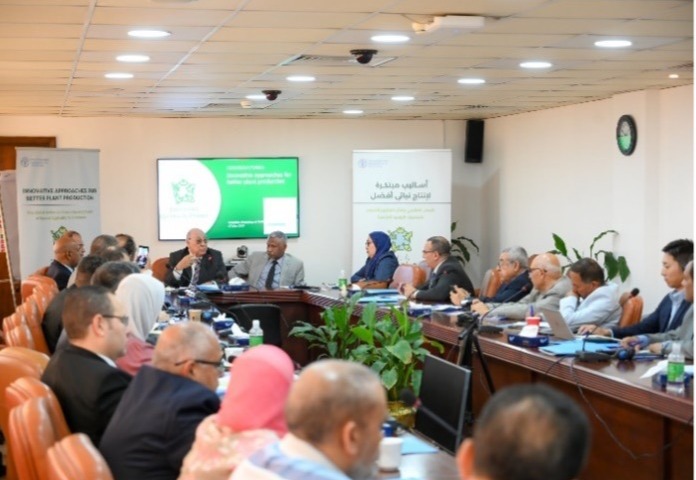News
Workshop sets out project for sustainable development of palm dates in Egypt

Cairo, Egypt – a project to sustainably develop palm dates in Egypt was presented by the Government of Egypt and the FAO office in Egypt for discussion with farmer representatives and other stakeholders.
Dates are the selected Special Agricultural Product (SAP) for Egypt under the One Country One Priority Product initiative (OCOP). This inception workshop, chaired by the representatives of the FAO office in Egypt, the Ministry of Agriculture and Land Reclamation of Egypt and the Ministry of Trade and Industry of Egypt, discussed why dates are important and the development activities that can be implemented in an OCOP country project to enhance this product’s value chain.
Participants were welcomed by Dr. Nasredin Hag Elamin, FAO Representative in Egypt, Prof. Dr. Mohamed Abdelmegeed chair of the National Taskforce on behalf of Prof. Dr. Mohamed Soliman President of the Agriculture Research Center (ARC) from the Ministry of Agriculture and Land Reclamation of Egypt, and Dr. Azza Fouad Nasr, from the Ministry of Trade and Industry of Egypt.
Members of the OCOP Secretariat based at FAO headquarters contributed to the workshop with briefings about the OCOP initiative as a global action: Dr. Mariam Awlia, Young Professional Officer, presented the key components of the OCOP Initiative and Dr. Jiang Shangchuan, Agricultural Specialist and OCOP Project Coordinator, presented the objectives for the OCOP demonstration country projects in Bangladesh, Egypt, Malawi, Trinidad and Tobago, and Uzbekistan.
At the regional level, coordinated activities underway in the Near East and North Africa were presented by Mr. Hiroaki Sonoda on behalf of the FAO Regional Office, with Egypt at the forefront as the region's OCOP demonstration country.
Finally, the workshop explored the activities of the OCOP country project in detail, with overviews provided by Prof. Dr. Mohamed Abdelmegeed, Prof. Dr. Ezz El-Din Gadalla, Mohamed Ismail and Eng. Khaled El-Haggan, all of whom are members of the OCOP National Task Force. A variety of stakeholders, some participating in person, others remotely, responded to the presentations with enthusiasm and exchanged apt suggestions for further developments.
Discussions on the importance of dates in Egypt and how this country project will be implemented
Egypt produces the largest quantity of palm dates in the world, according to FAOSTAT. Nevertheless, Egyptian dates face multiple, persistent challenges which undermine their quality, productivity and market value. Some of the challenges highlighted by Government officials are the underuse of mechanical/digital technologies, inadequate infrastructural and knowledge capacity, avoidable loss of product along the value chain, and the lack of international certification for Egyptian dates which would enable better livelihoods for those working with dates. This important product also faces the detrimental effects of climate change, as well as pests, such as the red weevil, which has become a prevalent threat across the country since the early 1990s. The OCOP country project in Egypt was designed to tackle these challenges with an integrated approach that considers the entire value chain. It consists of activities that develop the production, processing and marketing of dates.
Planned activities presented during the workshop included bolstering sustainable protection from pests, enabling the use of sustainable, value-adding technologies, such as climate-smart agriculture, and improving the visibility and reputation of Egyptian dates on national and global markets. This will enhance existing efforts in cooperation with FAO to develop palm dates in Egypt, such as the “Sixth International Egyptian Date Palm Festival” in 2022 and the Government of Egypt’s national strategy.
 |  |
Stakeholders representing farmers in Egypt and private companies working with palm dates at different stages of the value chain responded to the OCOP initiative presented with enthusiasm and by adding their insights and suggestions.
The way forward
The OCOP country project will develop a three-year work plan that elaborates on the overview presented at this inception workshop. Soon, the National Task Force will produce a document setting out a transparent plan that will serve as a reference for other countries to consider for their own projects to develop SAPs.
Now that the OCOP country project in Egypt is leading the way by demonstrating OCOP initiative implementation, the next step for regional coordination will be a regional launch event and workshop for country projects in the Near East and North Africa region which are presented on the Regional Knowledge Platform linked below.
Regional Knowledge Platform on One Country One Priority Product (OCOP) in Near East and North Africa (Available in English, French and Arabic)
Photo album from the inception workshop produced by the FAO office in Egypt
